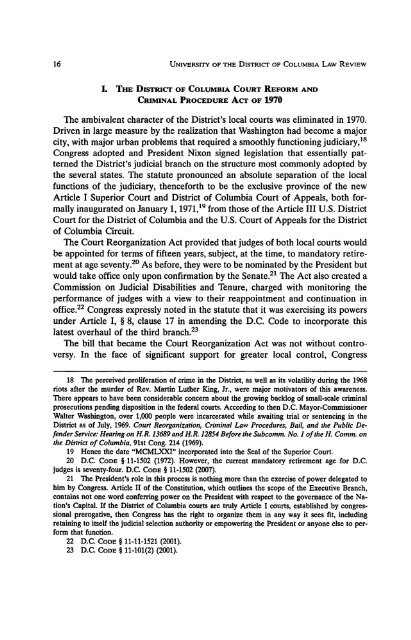Download Electronic Version - UDC Law Review
Download Electronic Version - UDC Law Review
Download Electronic Version - UDC Law Review
You also want an ePaper? Increase the reach of your titles
YUMPU automatically turns print PDFs into web optimized ePapers that Google loves.
16 UNIVERSITY OF THE DISTRICf OF COLUMBIA LAW REVIEW<br />
I. THE DISTRICT OF COLUMBIA COURT REFORM AND<br />
CRIMINAL PROCEDURE ACT OF 1970<br />
The ambivalent character of the District's local courts was eliminated in 1970.<br />
Driven in large measure by the realization that Washington had become a major<br />
city, with major urban problems that required a smoothly functioning judiciary,18<br />
Congress adopted and President Nixon signed legislation that essentially patterned<br />
the District's judicial branch on the structure most commonly adopted by<br />
the several states. The statute pronounced an absolute separation of the local<br />
functions of the judiciary, thenceforth to be the exclusive province of the new<br />
Article I Superior Court and District of Columbia Court of Appeals, both formally<br />
inaugurated on January 1, 1971,19 from those of the Article III U.S. District<br />
Court for the District of Columbia and the U.S. Court of Appeals for the District<br />
of Columbia Circuit.<br />
The Court Reorganization Act provided that judges of both local courts would<br />
be appointed for terms of fifteen years, subject, at the time, to mandatory retirement<br />
at age seventy.20 As before, they were to be nominated by the President but<br />
would take office only upon confirmation by the Senate. 21 The Act also created a<br />
Commission on Judicial Disabilities and Tenure, charged with monitoring the<br />
performance of judges with a view to their reappointment and continuation in<br />
office. 22 Congress expressly noted in the statute that it was exercising its powers<br />
under Article I, § 8, clause 17 in amending the D.C. Code to incorporate this<br />
latest overhaul of the third branch. 23<br />
The bill that became the Court Reorganization Act was not without controversy.<br />
In the face of significant support for greater local control, Congress<br />
18 The perceived proliferation of crime in the District, as well as its volatility during the 1968<br />
riots after the murder of Rev. Martin Luther King, Jr., were major motivators of this awareness.<br />
There appears to have been considerable concern about the growing backlog of small-scale criminal<br />
prosecutions pending disposition in the federal courts. According to then D.C. Mayor-Commissioner<br />
Walter Washington, over 1,000 people were incarcerated while awaiting trial or sentencing in the<br />
District as of July, 1969. Court Reorganization, Criminal <strong>Law</strong> Procedures, Bail, and the Public Defender<br />
Service: Hearing on H.R. 13689 and H.R. 12854 Before the Subcomm. No.1 of the H. Comm. on<br />
the District of Columbia, 91st Congo 214 (1969).<br />
19 Hence the date "MCMLXXI" incorporated into the Seal of the Superior Court.<br />
20 D.C. CODE § 11-1502 (1972). However, the current mandatory retirement age for D.C.<br />
judges is seventy-four. D.C. CODE § 11-1502 (2007).<br />
21 The President's role in this process is nothing more than the exercise of power delegated to<br />
him by Congress. Article II of the Constitution, which outlines the scope of the Executive Branch,<br />
contains not one word conferring power on the President with respect to the governance of the Nation's<br />
Capital. If the District of Columbia courts are truly Article I courts, established by congressional<br />
prerogative, then Congress has the right to organize them in any way it sees fit, including<br />
retaining to itself the judicial selection authority or empowering the President or anyone else to perform<br />
that function.<br />
22 D.C. CODE § 11-11-1521 (2001).<br />
23 D.C. CODE § 11-101(2) (2001).














